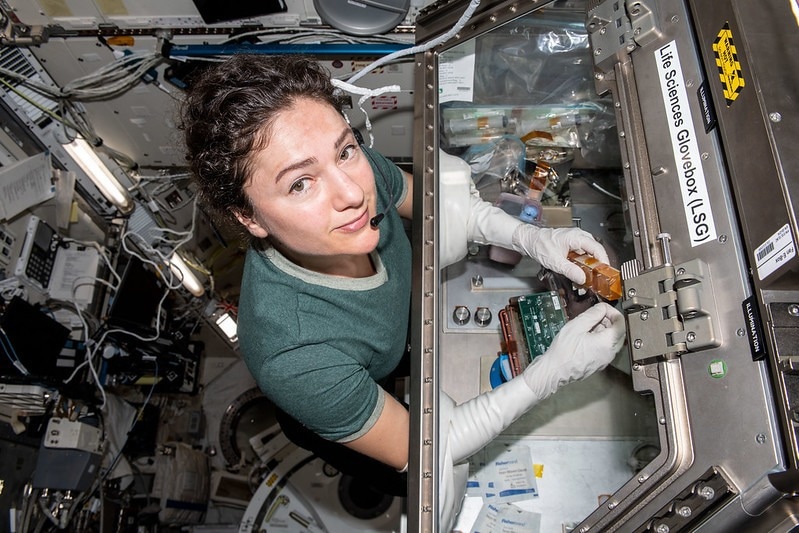For the seventh consecutive year, the U.S. National Science Foundation (NSF) is funding a solicitation seeking projects that utilize the International Space Station (ISS) National Laboratory to advance tissue engineering and mechanobiology research. Through this solicitation, NSF will provide up to $1.6 million in funding for multiple projects intending to leverage the orbiting laboratory.

NASA astronaut and Expedition 62 Flight Engineer, Jessica Meir, conducts cardiac research in the Life Sciences Glovebox onboard the International Space Station. Image Credit: NASA
Microgravity affects organisms—from bacteria to humans, inducing changes such as altered gene expression and DNA regulation, changes in cellular function and physiology, and 3D aggregation of cells. Research leveraging these effects can drive advances in modeling healthy and pathological tissues and organs, disease diagnosis and treatment, regenerative medicine, and many other areas within the engineering and biomedical sciences.
Fundamental science is a strategic focus area for the ISS National Lab, and knowledge gained from such studies could have profound impacts on future research and technology development that brings value to our nation and the scientific community. The Center for the Advancement of Science in Space™, manager of the ISS National Lab, has established powerful multiyear partnerships with government agencies such as NSF to fund fundamental research on the orbiting laboratory. NSF supports transformative research to help drive the U.S. economy, enhance national security, and maintain America’s position as a global leader in innovation.
A project selected from a prior NSF-funded solicitation from researchers at the University of California, San Francisco is slated to launch on SpaceX's upcoming 29th Commercial Resupply Services (CRS) mission to the space station. The investigation aims to utilize 3D-immune-liver tissue chips in space to better understand the relationship between immune system aging and the ability of liver cells to regenerate. The research team will then look for possible ways to slow the aging process and enhance the liver healing process for patients on Earth.
This solicitation follows a two-step submission process. All interested investigators must first submit an ISS National Lab Feasibility Review Form for evaluation of the concept’s operational feasibility. The deadline to submit a Feasibility Review Form is January 15, 2024. Only investigators whose concept passes the Feasibility Review Form step will be invited to submit a full proposal. The full proposal submission deadline is March 15, 2024.